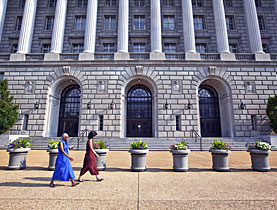Switzerland officially off OECD tax grey list

Swiss President Hans-Rudolf Merz says he is "proud" that the country is off an international list of tax havens but has warned that Switzerland is not in the clear.
On Friday, the Organisation for Economic Co-operation and Development (OECD) said Switzerland had been officially removed from the so-called grey list of tax havens.
The announcement came after Bern signed its 12th revised double taxation accord, with Qatar, on Thursday.
“We have received a respite but we are not out of the firing line,” Merz told swissinfo.ch. “There are trends within the European Union for an automatic exchange of information [in tax matters]. They are in particular being pushed by France and Germany.”
The Paris-based OECD, backed by the G20 group of major economies, had put Switzerland on the list for failing to comply with its directives on tax evasion.
Merz, who was in New York at the United Nations General Assembly’s 64th session, told a news conference on Thursday that “intensive work” had shown its rewards. He called the grey list “ominous”.
The Swiss president, who also holds the finance portfolio, said Switzerland would continue pursuing accords with other states and that negotiations were continuing.
New accords
Observers see the signing of the 12th double taxation agreement as a major step for foreign clients of Swiss banks, but add it does not mean that pressure on the country’s banking secrecy will ease completely.
Bern announced in March that it would comply with OECD norms on tax matters after pressure from the big players within the G20. It meant the end of the distinction between tax fraud and tax evasion.
François Savary, chief investment officer of the Reyl Asset Management bank, told swissinfo.ch that leaving the “grey list” would help to “calm things down… It will help us to go about our business in a more relaxed atmosphere”.
“Is this the end of the attacks [against Switzerland]? We shall see. It’s not necessarily the end of international pressure but we can hope to reach a balance between banking secrecy and the desire by other states to gain concessions from Switzerland.”
The double taxation accords must still be accepted by the parliament and citizens may have the final say in a nationwide vote. The finance believes the first agreement will come into force in 2011.
Switzerland’s model of direct democracy may extend the time it takes to fulfil the OECD’s demands, which could be a disadvantage, according to Sergio Rossi, economics professor at Fribourg University.
“There is also a risk that in six months time, the figure of 12 accords signed will no longer be enough,” he told swissinfo.ch
Numbers
The minimum of 12 double taxation accords set for Switzerland equals the number that both the United States and Britain have achieved.
Rossi says the spotlight will now be turned onto the remaining states that do not conform to OECD standards.
The result is that foreign clients of Swiss banks will have more “clarity” and “legal security”. The banks may also have to boost their image.
“The Swiss banking system will have to prove itself and communicate much more about its performance,” Savary said.
Rossi notes that foreign clients are mainly interested in the quality and expertise of Swiss banks, as well as the advice they receive. Switzerland was recently named the most competitive economy in the world by the World Economic Forum.
“For these clients, the great majority, depositing their money in Switzerland is still an interesting proposition. But for those clients who want to cheat the tax man, things have changed.”
Robert Brookes, swissinfo.ch (with input from Pierre-François Besson and Rita Emch in New York)
Switzerland has signed revised double taxation accords with Austria, Britain, Denmark, the Faroe Islands, France, Finland, Luxembourg, Mexico, Norway, Qatar, and the United States. The 12th state with which Bern has signed an accord is Spain. It is a particular case because it was already signed on June 29, 2006.
It allows Madrid the automatic right to apply new provisions signed by Switzerland with other European countries.
The OECD’s black list included those countries that have shown no progress in tax cooperation. There are currently no countries on this list.
The grey list contains countries which pledged to comply with OECD standards on tax matters but which have not signed revised double taxation agreements with at least 12 countries.
Belgium, Luxembourg and Austria have joined the white list of countries that comply.
The criteria are set to change. It will no longer be sufficient to sign 12 new accords and show good will. Countries will also have to demonstrate they are fighting against disparities in tax matters.

In compliance with the JTI standards
More: SWI swissinfo.ch certified by the Journalism Trust Initiative













You can find an overview of ongoing debates with our journalists here . Please join us!
If you want to start a conversation about a topic raised in this article or want to report factual errors, email us at english@swissinfo.ch.